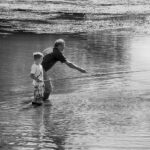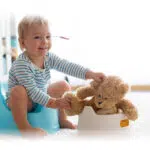Potty Training Awareness Month is celebrated in June every year. Potty training is something many parents worry about, but it’s not as drastic as most imagine. With a little time and support, your child will gain control of their bladder and bowel movements, and you won’t have to worry about changing their diapers anymore. Positive reinforcement makes things go smoother. The process will have its ups and downs, and there will be accidents along the way because mistakes are inevitable. It’s important to stay positive and be patient during this time. When your child is ready, they’ll pass this milestone.
History of Potty Training Awareness Month
Potty training is an aspect of human development that has fascinated scientists for many years. Even today, it’s a common belief that an individual’s personality is shaped by how and when they were toilet-trained. This mindset likely has a lot to do with Sigmund Freud, one of the most controversial yet influential psychologists of the 19th century. Freud’s theories on psychosexual development are still the subject of debate in the present day, and one of the most popular subtopics is the anal stage.
In 1905, Freud presented his theory of sexuality in childhood development. He theorized that between the ages of one and three, a child would naturally develop a need to control their bladder and bowel movements. Freud further stated that the success of this process depended on the approach the parents took in potty training. Using praise and rewards for proper toilet etiquette produced more positive results. Children felt more capable and confident, and as a result, grew into more capable, confident adults. Those who received negative responses became anal-expulsive, resulting in messy, destructive personalities. Overly strict parents produced a child with anal-retentive personalities, making them uptight and obsessive.
While these theories are intriguing, they are outdated and have little scientific evidence to back them up. Today we know that potty training has no long-lasting effect on a child’s personality, development, or intellectual ability. Some may learn faster than others, but timelines don’t matter. Your child will get there in the end. Potty Training Awareness Month helps parents with tips and tricks, easing their child into a smooth transition from diapers to toilets.
Potty Training Awareness Month timeline
Maria Allen becomes the first person in the U.S. to mass-produce diapers.
The first disposable pair of diapers is created in Sweden.
At East German childcare centers, children are toilet-trained in groups using large potty benches.
Pampers introduces a diaper for five-year-olds, in keeping with a paradigm shift suggesting that delayed toilet training isn’t that harmful.
Potty Training Awareness Month FAQs
Is toilet training a milestone?
Yes, learning how to use the toilet is a developmental milestone for children.
Is potty training too early harmful?
It may lead to accidents if the child’s bladder isn’t developed enough. It may also lead to constipation if the child holds their bowel movement for longer than they should.
At what age should a child be fully toilet trained?
Many children are ready between the age of 18 and 24 months but others may not be ready until they’re three years old.
Potty Training Awareness Month Activities
Begin potty training
It’s what this holiday is for. Kick off the potty training for your child this June. You’re sure to have made some progress by the end of the month. And your child will learn some things along the way, too.
Make it fun
Once you’ve begun potty training your child, find some ways to make it fun. You can do this by giving them gifts or praising them for a job well done.
Be involved in the process
Don’t just issue commands like a drill sergeant. Potty training is a strange, alien concept to a child so you must be fully involved in the process. Answer their questions. Show, don’t tell.
5 Facts About Potty Training
Setbacks are normal
Over 80% of infants experience setbacks during potty training, so don’t be discouraged by any learning difficulties.
Children urinate multiple times a day
Because their bladders are still developing, most toddlers urinate between four to eight times a day.
Skipping a day or two is common
Some children may skip a day or two in bowel movements, so if this happens with your child, it doesn’t mean something is wrong.
No link between toilet training and intelligence
The speed at which a child becomes fully toilet-trained has no bearing on their future abilities or intelligence.
You can’t rush the process
When all is said and done, your child becomes fully potty-trained when their physiology is developed enough to handle it.
Why We Love Potty Training Awareness Month
It’s about the little things
Potty training is one of those small but significant aspects of raising a child just like learning to ride a bike or losing their milk teeth. It may not be much fun teaching them and correcting their mistakes but in the end, it’s a rewarding experience for a parent.
No more diapers
Nobody likes changing stinky diapers. It’s a necessary but unpleasant part of parenting that we all have to get used to eventually. During Potty Training Awareness Month we have something to look forward to — never changing diapers again.
Children learn to be independent
During this time, our children learn to be a bit more independent. This is always a bittersweet thing for parents. In this case, however, it's mostly sweet. No more messy, inconvenient accidents for you to clean up.
Potty Training Awareness Month dates
| Year | Date | Day |
|---|---|---|
| 2026 | June 1 | Monday |
| 2027 | June 1 | Tuesday |
| 2028 | June 1 | Thursday |
| 2029 | June 1 | Friday |
| 2030 | June 1 | Saturday |
















































































































